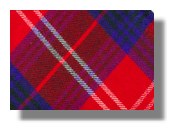
 The name Chisholm is from a Norman French word "chese" meaning "to choose" and the Saxon word "holm" meaning "meadow. They became established first in the county of Roxburgh in the Border area of Scotland and the earliest record of the name is John de Chesehelme who is mentioned in a letter from Pope Alexander IV in 1254. John de Chesolm from Berwick and Richard de Chesolm from Roxburgh both signed the Ragman Rolls of King Edward I in 1296 and were two of 2,000 landowners and clergy to do so. The seal used by Richard shows the head of a boar which is part of the family coat of arms to this day. A number of other Border families also have a boar's head in their arms (Gordons, Elphinstones, Nisbets, Hoggs, Swintons) and may be descended from the Anglo-Saxon rulers of Bernicia in Northunbria.
The name Chisholm is from a Norman French word "chese" meaning "to choose" and the Saxon word "holm" meaning "meadow. They became established first in the county of Roxburgh in the Border area of Scotland and the earliest record of the name is John de Chesehelme who is mentioned in a letter from Pope Alexander IV in 1254. John de Chesolm from Berwick and Richard de Chesolm from Roxburgh both signed the Ragman Rolls of King Edward I in 1296 and were two of 2,000 landowners and clergy to do so. The seal used by Richard shows the head of a boar which is part of the family coat of arms to this day. A number of other Border families also have a boar's head in their arms (Gordons, Elphinstones, Nisbets, Hoggs, Swintons) and may be descended from the Anglo-Saxon rulers of Bernicia in Northunbria.
According to legend, two Chesolm brothers saved the life of one of the Scottish kings in the 14th century and were granted land in Inverness-shire. Certainly, Sir Robert Chisholm was appointed constable of Urquhart Castle in 1359 but that was in succession to his maternal grandfather. His younger son remained as chief of the Chisholms in the Borders. A son of the Borders line established the Chisholms of Cromlix in Perthshire.
Alexander, Sir Robert Chisholm's eldest son, married Mary of Erchless and Comar. Erchless Castle became the seat of the Chisholm's and remained so for 500 years until the early 19th century.
Following the church Reformation in the 16th century, the Chisholms remained firmly Catholic and indeed the Perthshire Chisholms supplied three successive Bishops of Dunblane. When the Spanish Armada sailed to attack England in 1588, there were concerns about plots against Scotland and Sir James Chisholm of Cromlix was summoned to appear before the General Assembly of the Church of Scotland. Although no charges were brought, Sir James was later denounced in 1592 for "treason against the true Religion".
In the following century the clan chiefs became Protestant, although tolerant of the Catholic faith amongst their followers. Despite their religious conversion, the Chisholms rose in support of the Catholic "Old Pretender" in the Jacobite Uprising of 1715. They rose again in 1745 and 30 were killed at Culloden, including one of the chief's sons. After the defeat, Bonnie Prince Charlie trusted his life to eight of his followers, of whom three were Chisholms. When the Prince left from the west coast towards the Hebrides and exile, Hugh Chisholm shook hands in farewell. He vowed never to shake hands again and is said to have kept his vow to his death at a ripe old age.
After the 1745 Uprising, many clansmen emigrated, some voluntarily, others helped by periods of increased rents and forced clearances. In 1887 the chieftainship passed via an heiress to a James Gooden-Chisholm in Surrey. However, descendants adopted the Chisholm name and are now among those who form the Council of Scottish Clan Chiefs. The clan chief is referred to as "The Chisholm".
The Border Chisholms continued as a landed family until the end of the 19th century. The Cromlix lands passed to the Drummonds through marriage before 1600.
The Chisholm clan motto is "Feros ferio" which means "I am fierce with the fierce".
There is a Chisholm clan Web site here.



